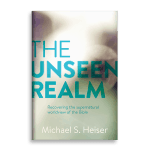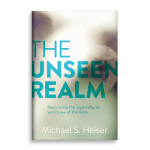
The Big Picture
Surveys taken within the past decade show that three-fourths of Americans believe in the supernatural world of God and angels. Christians heartily embrace the concept of the supernatural, presuming that the Bible?s description of spirits, demons, and miracles must be true in order for Scripture to have any consistent meaning.
However, we do face a challenge. Our modern, Western Christian culture seems content with an approach to the Bible which tends to tame or quiet its supernatural element. Think of the story of Noah and the ark, with its pairs of animals streaming to the boat. Every child can picture this. But it?s not so easy to recall the odd event which led up to it. Preachers are tempted to skip over the sons of God marrying the daughters of men (Gen 6:1?4)?whatever that means?hoping to get to the more sensible story of the flood. As a result, what the writer wanted to accomplish may be lost because we?re uncomfortable with what appears to be a super-natural moment in the story. We can only imagine how this harms the meaning of the Bible on a larger scale.
Supernatural and this study guide will challenge your thinking concerning the supernatural world of the Bible. At the heart of this challenge is a simple question, which sets in motion all that is to follow: Are the ?gods? of the first commandment (?You shall have no other gods before me?) real, personal beings? For whatever reason, most readers of the Bible have not given this question serious consideration. You may have never thought it to be a question at all. Regardless, consider this book as your unique opportunity to experience the Bible with the view that gods actively live in the heavens and function as gods do. This challenge will be as fascinating as it is enjoyable, and it will result in a deep appreciation for the full story of Scripture.
A quick illustration may help get us going. Imagine a wife overhearing her husband talking on the phone. She first gets suspicious, then jealous, as she hears him share intimate conversation. Finally, she has had enough and grabs the phone to confront the caller. To her surprise, no one is there. He had been speaking to a dial tone.
In this light, consider what God meant in Deuteronomy 6:14?15: ?You shall not go after other gods, the gods of the peoples who are all around you?for the Lord your God is a jealous God?lest the anger of the Lord your God be aroused against you and destroy you from the face of the earth? (NKJV adapted). Would the Israelites have been tempted to worship what only amounted to a dial tone? Or would they have faced temptation to worship real gods in Canaan?
Knowledge in Action
Henry Ford was famous for his automobile assembly line, but behind the scenes he depended heavily on the mechanical engineering skills of his friend Charles Steinmetz. On one occasion, Ford?s assembly line ground to a halt for reasons no one could understand. In a panic, Ford asked Steinmetz to see if he could make the necessary repairs.
Steinmetz was happy to help his friend, and it wasn?t long before the assembly line was up and running. Ford was pleased, of course, until he looked at the bill?Steinmetz wanted $10,000.
?Charles, you can?t be serious,? Ford complained. ?You tinkered in there for about ten minutes.?
?You?re right,? Steinmetz admitted, ?I made a mistake.? He took the bill and changed it to:?Tinkering: $10. Knowing where to tinker: $9,990.
This story reminds us of the challenge in understanding the Bible. We make an adjustment here, an interpretive move there. Sometimes the changes we make are large, but more often they?re small. As we make adjustments to our interpretations, we try to keep track of how the Bible reads differently, and hopefully more clearly, when applying one change and possibly dispensing with another. It?s like test-driving a car. We read the Bible hoping that someday, with time and care in the process of making trial runs with its multiple dead ends and periodic successes, we will experience a smooth running story of Scripture that hugs every curve and climbs every hill with ease.
Think about the challenge that awaits you. This study and Supernatural propose what is actually a very small change?a small tinkering with the text, if you will?but one which will likely have far-reaching results: Do other gods exist? And what would the Bible sound like if they did?
Discussion Questions
- To date, what effort have you given to considering the question, ?Are the gods of the first commandment real?? What are the reasons behind your answer?
- The story of 1 Kings 22 was discussed in chapter 1 of Supernatural. Did you read this story before? If so, how did you interpret what was going on?
- We will be discussing the concept of idols in coming sections of our study. But what are your initial thoughts about them? Why do you think idols have played such a major role in religion, and how are they related to the concept of a god?
- On the front end?before getting into the meat of our study?what do you predict will change in your interpretation of the Bible if small-g gods do exist?
* * *
Adapted from Supernatural: A Study Guide?by Ronn Johnson. This study guide is exclusively available in the Logos edition of Supernatural by Michael Heiser.






